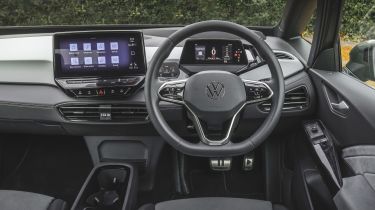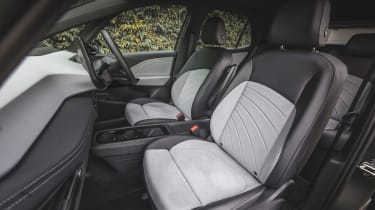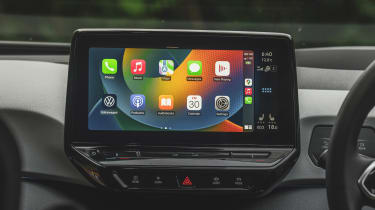Volkswagen ID.3 review: interior, dashboard & infotainment
A much-needed mid-life facelift has made a huge difference to the Volkswagen ID.3’s previously cheap-feeling interior
The Volkswagen ID.3 is part of a new generation of cars with barely any physical buttons in the cabin. Almost all controls are contained within the touchscreen display on the dashboard. This is both good and bad – it means the cabin looks neat and tidy, but can make functions frustrating to access while driving.
There’s a small gear selector, but everything else – the navigation, climate control, audio and other functions – is controlled on the touchscreen. There’s also a tablet-like screen behind the steering wheel, which takes the place of traditional dials and shows lots of useful information.
Volkswagen ID.3 dashboard
Following a much-needed update for facelifted 2023 cars, every Volkswagen ID.3 gets a new soft-touch dash with stitched material that makes the electric family car feel much more upmarket. Early models were heavily criticised for their interior quality, so it’s good to see VW listening to this feedback.
That said – at least for the time being – Volkswagen is persisting with its fiddly 10-inch touchscreen, which is glitchy and slow to respond. You can read more on this below, but suffice to say this really lets down what is an otherwise accomplished family car.
An interesting feature of the ID.3's dashboard is the 'ID. Light' bar that runs along the bottom of the windscreen. It can change colour in certain situations, flickering white when you're giving a voice-activation command, blue when giving sat-nav directions, green when a phone call is incoming, and red when the driver-assistance technology is warning of a possible hazard.
Equipment, options & accessories
As of mid-2023, the ID.3 is only available in two trim levels: Business, Style and Tour gave way to the simpler Pro and Pro S specs when the car was facelifted. This not only corresponds to the kit on offer, but also the size of the battery and therefore the range each model can manage on a charge.
Pro cars get a 58kWh battery for up to 265 miles of range. Prices (at the time of writing) start at around £37,000 and standard kit includes 18-inch wheels, LED lights, heated seats and two-zone climate control, plus that previously mentioned 10-inch screen and digital instrument cluster. It’s this model that’d we recommend.
Upgrading to Pro S (for an extra £5,755) brings a bigger 77kWh battery and longer 347-mile range, plus 19-inch wheels and better seats with electric lumbar adjustment. Pro S cars also upgrade the ID.3’s DC rapid charging capability from 120kW (Pro cars) to 170kW, slashing the car’s 10-80% top-up time to less than half an hour.
Options include things like 30-colour ambient lighting, extra paint choices and an energy efficient heat pump to help preserve range in extreme conditions.
Infotainment, apps & sat nav
The 10-inch touchscreen display in the middle of the dashboard is the main way you control the ID.3's functions. The panel is well positioned, but that’s where the positives end; the navigation graphics are already beginning to look a little dated and while the main menu functions are split into eight large tiles, the screen itself is glitchy and slow to respond. The setup is improved slightly with the standard-fit Apple CarPlay and Android Auto smartphone connectivity, but you still have to battle with the otherwise laggy display.
Volkswagen has already confirmed that as of mid-2024, it will offer a larger, updated 12-inch screen and we can only hope this rectifies some of our complaints. As it stands, the infotainment system is one of only a handful of weak links in the otherwise impressive ID.3 package. Especially when compared to the Google-powered system in the Renault Megane E-Tech, which we found far more snappy, innovative and user-friendly.
The ID.3’s touch-sensitive sliders for the cabin temperature and media volume are also a bug bear for us. You can easily nudge them when trying to use the touchscreen above, and because they’re not backlit, adjusting anything at night with them is very difficult. This should also be fixed when the larger screen arrives next year.
Early examples of the ID.3 didn't have wireless phone charging, even as an option, but it's now standard across the range. There’s also a smartphone app for use outside the car, which can pre-heat or cool the interior, control charging and let you see how much range you have left.






